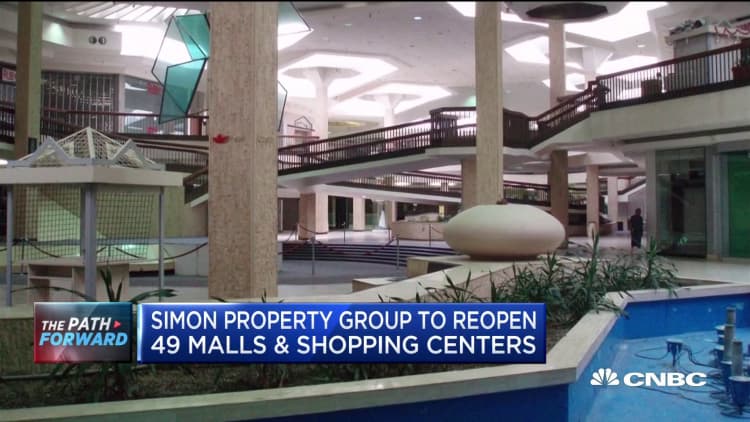
Simon Property Group, the biggest U.S. mall owner, said Wednesday that it has exercised its contractual rights to terminate its deal to acquire high-end mall owner Taubman Centers.
Taubman shares initially tanked more than 40% on the news, but were recently down about 18%. Simon shares were last down about 3%.
Taubman later Wednesday afternoon confirmed in a statement that it received the termination notice from Simon. It said it believes the termination is "invalid and without merit, and that Simon continues to be bound to the transaction in all respects."
Taubman said it intends to hold Simon to its obligations, and that it will "vigorously contest Simon's purported termination and legal claims." It added it will pursue, among other legal remedies, the right to monetary damages, including damages based on the $3.6 billion deal price tag. Taubman said it still plans to hold a shareholders meeting to vote on the deal, on June 25.
Simon's termination of the $3.6 billion deal highlights just how much stress retail landlords have come under during the coronavirus pandemic. Simon is already in the midst of suing Gap, its biggest nonanchor tenant, for not paying rent. Mall owner CBL & Associates earlier this month warned that its ability to continue as a going concern is in doubt, as skipped rent payments by retailers forced it to miss an interest payment.
Simon said in its press release that the merger agreement "specifically gave Simon the right to terminate the transaction in the event that a pandemic disproportionately hurt Taubman."
"Taubman's significant proportion of enclosed retail properties located in densely populated major metropolitan areas, dependence on both domestic and international tourism at many of its properties, and its focus on high-end shopping have combined to impact Taubman's business disproportionately due to the COVID-19 pandemic when compared to the rest of the retail real estate industry," it said.
On Feb. 10, about a month before the coronavirus outbreak was declared a pandemic, Simon had announced it agreed to buy Taubman in a deal valued at $3.6 billion.
The companies, at the time, said Simon would acquire Taubman's stock for $52.50 a share, or a 51% premium to where Taubman shares had closed the previous trading day.
But since then, mall owners' shares, including Taubman's, have lost significant value during the pandemic, as many retail stores and shopping centers were temporarily forced shut in late March. Investors have fled the space.
Taubman shares had closed Tuesday at $45.25, well below the deal price.
Simon explained that its termination is based on two grounds.
One is that the Covid-19 crisis has had a "uniquely material and disproportionate effect on Taubman compared with other participants in the retail real estate industry."
Second, Simon argues that Taubman has breached its obligations, specifically by not taking steps "to mitigate the impact of the pandemic as others in the industry have." Simon said Taubman has not made essential cost cuts.
Simon said it filed a suit Wednesday morning in the Circuit Court of Oakland County, Michigan, against Taubman, which is based in the state.
In the suit, which was reviewed by CNBC, Simon writes: "Taubman apparently believes that it can avoid any sense of fiscal prudence, severely deplete its cash reserves, and imprudently incur enormous debt — so that it can continue to generously reward its executives, employees, and investors, and make enormous expenditures — because it hopes to force Simon to pick up the pieces of what is left of Taubman after their deal closes."
This back-and-forth is expected to hang over the entire industry, according to one analyst.
Mall owner Macerich shares were down 6% Wednesday. Washington Prime Group shares were down nearly 12%.
"It's unclear if the decision to terminate the agreement will lead to a legal case, a renegotiation or the end of a merger," RBC Capital Markets real estate investment trust analyst Wes Golladay said in a note to clients. "However, we expect the uncertainty to be an overhang until it is resolved."



